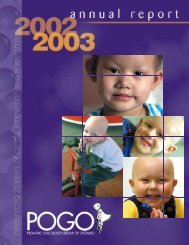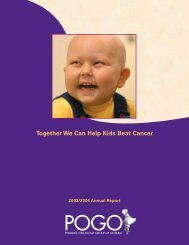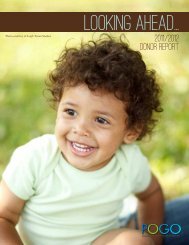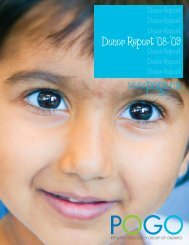Caring..
2004/2005 Annual Report - the Pediatric Oncology Group of Ontario
2004/2005 Annual Report - the Pediatric Oncology Group of Ontario
- No tags were found...
You also want an ePaper? Increase the reach of your titles
YUMPU automatically turns print PDFs into web optimized ePapers that Google loves.
Bringing care closer to home<br />
Following through…<br />
Located in six community hospitals across Ontario,<br />
POGO’s pediatric oncology satellite centres provide<br />
many aspects of children’s ongoing cancer care close to<br />
their home, while helping to reduce the workload at<br />
Ontario’s five tertiary childhood cancer centres. The<br />
centres follow well-researched POGO standards and<br />
guidelines to ensure the best possible care for children<br />
across Ontario. Over the past year, the centres offered<br />
care for almost 300 children and their families.<br />
Christopher is an engaging five-year-old with big<br />
blue eyes and an elfin grin. He was just a toddler<br />
when he was admitted to Toronto’s Hospital for<br />
Sick Children (HSC) with a type of cancer known<br />
as Langerhans cell histiocytosis. His mother, Tracy,<br />
recalls months of driving back and forth between<br />
Kitchener and Toronto. “I have nothing but praise<br />
for the HSC staff,” she says, “But those early days<br />
were miserable. Christopher couldn’t eat or drink<br />
before his treatment and we had to get up before<br />
dawn to be sure that we’d arrive in time for our<br />
appointment.” It was a relief when Christopher was<br />
finally able to have his treatment transferred to the<br />
POGO satellite clinic at the Grand River Hospital<br />
Patti Bambury, RN, Satellite Coordinator at Grand<br />
River Hospital (left), with Christopher and his mother,<br />
Tracy. She knows how much it means for families<br />
to have their child’s care provided close to home.<br />
in Kitchener. “The care is excellent,” notes Tracy,<br />
“and we’re only ten minutes away from the hospital.”<br />
Lesley Collins, POGO’s Manager of the Satellite and<br />
AfterCare Programs notes: “Everyone has worked very<br />
hard to ensure that the Satellites provide the same<br />
quality of care as that of the tertiary centres.” The child’s<br />
care is still coordinated through the tertiary centre where<br />
they were first diagnosed and treated, but it is the<br />
Satellites that carry out the ongoing program of care.<br />
The family returns to the tertiary centre from time to<br />
time, for follow up, or if there are major interventions<br />
that are more appropriately handled at the tertiary<br />
center. Lesley stresses that, “The collaboration and<br />
communication between the tertiary and satellite<br />
centres has been critical to their success.”<br />
A sixth satellite was opened this past year, at the Rouge<br />
Valley Health System, Centenary Health Centre and<br />
POGO is continuing to look for ways to provide<br />
components of care in remote places. It is also developing<br />
processes for local health care providers who want to<br />
provide more knowledgeable care for children with<br />
terminal cancer, within their home community.<br />
It’s easy to assume that once a child’s cancer is cured<br />
they will go on to live a completely normal life. But<br />
for as many as half of all childhood cancer survivors,<br />
the toll of the disease and treatment on their young,<br />
developing body shows up in later years. Problems<br />
may include cardiac complications, fertility issues,<br />
neuro-cognitive impairments (such as learning disabilities)<br />
and secondary cancers. There is evidence that early<br />
identification and treatment of potential complications<br />
can improve outcomes. Using well-researched guidelines<br />
developed by POGO, seven AfterCare Clinics offer<br />
services to monitor and promote the well being of<br />
these individuals. The Clinics also provide a vitally<br />
important avenue to collect data for POGO’s Research<br />
Unit; data that may lead to treatment changes that<br />
will benefit future generations. With funding from the<br />
Ministry of Health and Long-Term Care, and POGO’s<br />
support, two new AfterCare Clinics were opened<br />
this past year. Together, the seven Clinics currently<br />
serve more than a thousand children and close to<br />
nine-hundred adult survivors, across Ontario.<br />
Lisa Lamoureux was only two months old when she<br />
was diagnosed with neuroblastoma, the most common<br />
cancerous tumor in infants and young children.<br />
She had one tumour in her neck and another in her<br />
abdomen. Fortunately she responded well to treatment.<br />
Now 20, she’s in her third year of criminology at<br />
Carlton University, with hopes of becoming a lawyer.<br />
When she turned 18, she transferred from the AfterCare<br />
Clinic at the Children’s Hospital of Eastern Ontario<br />
(CHEO) to the Adult Late Effects Clinic at The Ottawa<br />
Hospital Regional Cancer Centre (TOHRRC).<br />
So far, Lisa has had no lasting effects from her cancer,<br />
but she’s aware of the risks and knows that regular<br />
checks are important. “Last year, I was having some<br />
stomach problems,” she recalls, “I worried that it<br />
Even with her heavy<br />
course load, Lisa<br />
Lamoureaux always<br />
takes time for her<br />
annual check-up<br />
at POGO’s Adult<br />
Late Effects Clinic.<br />
“It’s kind of like a<br />
safety net,” she says.<br />
might be a recurrence of my cancer. The staff checked<br />
me out and reassured me that it was not a tumour.<br />
They understood why I was worried because they<br />
knew my history. It’s kind of like a safety net. I drop<br />
in for my echocardiogram and a couple of other<br />
tests every twelve months and then I’m good to go<br />
for another year!”<br />
Dr. Karen Mandel is a Pediatric Haematologist/Oncologist,<br />
and Director of POGO’s AfterCare Program in Ottawa.<br />
Twice monthly, she runs the Adult Late Effects Clinic<br />
at TOHRCC. “As we learn more about the long-term<br />
effects of some cancer treatments,” observes Dr. Mandel,<br />
“we’re making adjustments to the acute treatment.<br />
For example, after seeing, through the Late Effects<br />
Clinics, the outcome of those treatments on children’s<br />
ability to learn, we have modified or eliminated radiation<br />
treatments to the head in children with leukemia.<br />
Clearly, the AfterCare program is important to<br />
today’s childhood cancer survivors because it provides<br />
expert medical knowledge of their special needs.<br />
It is also a vital source of information that will<br />
benefit future generations.”<br />
2004-2005 HIGHLIGHTS<br />
• This year’s fundraising<br />
Gala attracted 650 guests<br />
and raised over $160,000<br />
for the POGO Pediatric<br />
Oncology Financial<br />
Assistance Program<br />
• POGO’s Financial<br />
Assistance Program<br />
provided support<br />
to 1,100 families<br />
with children in<br />
cancer treatment<br />
• POGO helped several<br />
Central-American countries<br />
establish their own<br />
databases, contributing<br />
to local planning and<br />
improved care<br />
06







